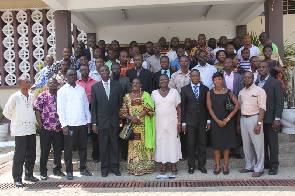 Enforcement of the law banning the importation and use of substandard vehicle tyres in the country will take effect from September 1, 2015, the National Road Safety Commission (NRSC) has said.
Enforcement of the law banning the importation and use of substandard vehicle tyres in the country will take effect from September 1, 2015, the National Road Safety Commission (NRSC) has said.
It means that among other things, tyres that are more than four years old from the date of manufacture, labelled C and meant for cold areas, have portions of the cord exposed; those that are under-inflated, over-inflated, have a limp or bug and worn out, cannot be used in the country.
The Director of Planning and Programmes of the NRSC, Mr David Osafo Adonteng, told the Daily Graphic that the regulation was aimed at ensuring safety on the roads and preventing road traffic accidents, since tyres contributed to 30 per cent of all fatal crashes.
He also said a study conducted by the NRSC had shown that most of the tyres used by vehicles on the roads were substandard.
Mr Adonteng added that in furtherance of the ban, a taskforce comprising representatives of the NRSC, Driver and Vehicle Licensing Authority (DVLA), Motor Traffic and Transport Department (MTTD) and Vehicle Tyre Dealers Association, would visit the offices and premises of all interest groups from May 1, 2015 to August 30, 2015 to address all related concerns to ensure a smooth implementation of the regulation.
Regulation 62 of the Road Traffic Regulation 2012, LI 2180, provides that the importer of a motor vehicle or trailer shall ensure that the motor vehicle or trailer “is fitted with pneumatic tyres manufactured for use in hot and normal areas labelled temperature Class A or B”.
In addition, importers are to ensure that tyres are of the specified size and can withstand the maximum permissible loads of the motor vehicle to which they are fitted, meaning a saloon car tyre should not be used by a pickup.
The regulation also specifies that importers are to make sure that vehicles or trailers are fitted with tyres whose pressure is specified by the vehicle manufacturer, and that the maximum thread depth of all categories of tyres must be 1.6 millimetres.
It indicates that anyone who drives or is in charge of a motor vehicle should ensure that the vehicle is equipped with a spare tyre that meets the required standard and is inflated.
According to the regulation, a person who contravenes the regulation commits an offence and is liable on summary conviction to, among others, a term of imprisonment of not less than 30 days and not more than three months.
Mr Adonteng explained that substandard tyres did not only refer to used tyres, since some new tyres could also be substandard, adding that the reference is to all tyres, whether old or new, that do not comply with Regulation 62 of the Road Traffic Regulation.
“Over 15 per cent of vehicles involved in fatal crashes in the country had some form of tyre defect prior to the crash. The use of substandard or bad tyres reduces braking capabilities of vehicles and increases the probability of accidents in wet conditions.
Substandard or bad tyres increase the risk of accidents by 30 per cent in Ghana and motorists driving vehicles with bad tyres are more likely to be the party at fault in road crashes” he said.





